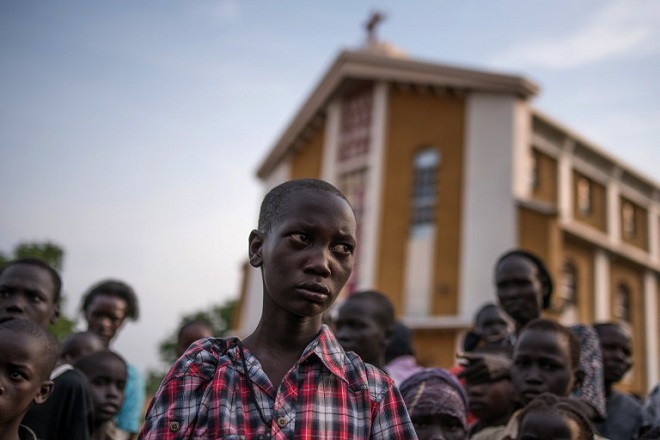
Juba, South Sudan | AFP |
A ceasefire in South Sudan’s capital appeared to hold for a second straight day Wednesday after intense fighting that killed hundreds of people and forced tens of thousands to flee their homes.
No gunfire or artillery was heard in Juba and evacuation flights for foreign nationals were able to leave the international airport, although commercial flights were yet to resume.
“No gunshots today. I have seen no tank, no helicopter,” said a city resident who did not want to be named. “There are a lot of soldiers and policemen in the streets patrolling.”
More people emerged but many remain cautious after four days of heavy fighting that began in earnest on Friday evening, took a pause on Saturday — the young country’s fifth independence anniversary — and resumed Sunday and Monday.
The death toll from Sunday’s and Monday’s battles is not yet known but around 300 were killed in just a few hours on Friday.
Adama Dieng, the UN Special Advisor on the Prevention of Genocide, said some civilians “were reportedly targeted based on their ethnicity”.
African Union Commission chairwoman Nkosazana Dlamini-Zuma called the situation in South Sudan “totally unacceptable”.
The United Nations said around 36,000 people had fled their homes for the perceived safety of UN bases, churches and aid agency compounds.
Two Chinese UN peacekeepers were killed and others wounded.
The fighting was heaviest in an area called Jebel to the west of the city where ex-rebels had a military base close to a UN camp for people previously uprooted in the civil war.
Juba calm
The calm was welcomed by Juba residents who have mostly stayed indoors for days as fighting intensified between Kiir’s government forces and former rebels loyal to Machar.
“The situation is quiet near the airport,” said local resident August Mayai. “There are people in the streets.”
Traders returning to once-busy markets found their shops and stalls looted.
Volunteers and officials from South Sudan’s Red Cross set about the grim task of collecting bodies of the dead.
There has been no estimate so far of civilian or military casualties from the heavy clashes Sunday and Monday but Adama Dieng, the United Nations’ Special Advisor on the Prevention of Genocide, said some civilians “were reportedly targeted based on their ethnicity.”
Kiir is from the Dinka tribe and Machar is a Nuer. South Sudan’s civil war has been characterised by ethnic massacres between the two groups — including in Juba — as well as rape, sexual slavery, murder and the use of child soldiers.
UN sounds alarm on aid
The head of the UN food agency said 75 percent of the population needed humanitarian aid after the fighting, adding that the World Food Programme had “over 2,000 people taking shelter inside our compound with our staff”.
“Three quarters of the population of South Sudan is in need of humanitarian assistance,” WFP chief Ertharin Cousin told AFP in Amman.
“This latest conflict is going to push even more people into hunger and despair,” she warned.
The recent fighting began in earnest on Friday evening — killing over 300 soldiers that day alone, according to government estimates — then paused on Saturday, the country’s fifth anniversary of independence.
Intense fighting resumed on Sunday.
The violence has raised fears of a return to the civil war that broke out in December 2013.
An August 2015 peace deal was supposed to end the conflict but has so far failed to do so, despite the return of rebel leader Machar in April to join a government of national unity alongside his enemy Kiir.
On Monday evening Kiir and then Machar both ordered ceasefires after a chorus of condemnation from the United Nations, regional bloc IGAD, the United States and others.
‘Anything can happen’
Despite the pause in fighting Juba remains on tenterhooks.
“We are on the lookout because anything can happen,” said one resident who did not want to be named. “We’ve had the same situation before: we thought it was going to be fine, and it wasn’t.”
Rashid Abdi, an analyst at the International Crisis Group think tank in Nairobi, shared that scepticism.
“Any cessation of fighting activities, even for a day, is welcome,” he said. “But whether the ceasefire will hold is another discussion.”
The impact of the days of violence on an already weak and scarcely implemented peace deal remains to be seen.
At least 36,000 people have fled their homes in Juba since Friday, according to UN figures, with many heading for United Nations bases seeking refuge.
But even there they were not safe, with the UN saying eight people were killed and 67 injured at so-called “Protection of Civilian” sites since Sunday.
Two Chinese peacekeepers were also killed and others wounded.
International flights to Juba were still suspended on Tuesday morning, although some private charter flights were able to evacuate foreigners and aid workers.
South Sudan has seen more fighting than peace since independence in July 2011, with clashes continuing even after the August 2015 peace deal.
Tens of thousands have died in the violence, with close to three million forced from their homes and nearly five million surviving on emergency food rations.
The humanitarian crisis has unfolded alongside an economic one with the currency collapsing and inflation spiralling out of control. The country’s mainstay oil industry is in tatters and regional towns have been razed.
 The Independent Uganda: You get the Truth we Pay the Price
The Independent Uganda: You get the Truth we Pay the Price



